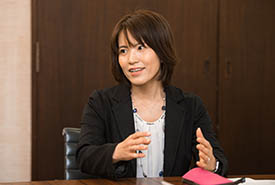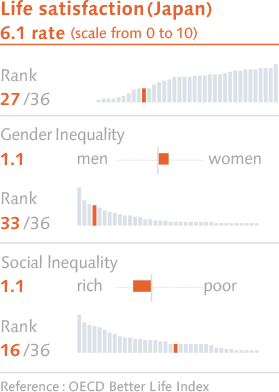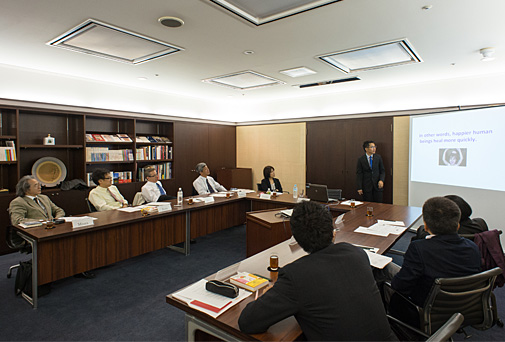Forum Report
On May 11, 2013, Reexamining Japan in Global Context’s second seminar took place at Suntory Foundation in Osaka. The theme of the event was "Unhappy Japan: Exploring the Sources of Gloom under Peace, Prosperity, and Democracy."
Postwar Japan has overcome the devastation of war and poverty to become one of the world’s economic superpowers. However, numerous polls show that the degree of happiness felt by ordinary Japanese has never risen. In the second seminar, we invited Dr. Nattavudh Powdthavee, an economist and Principal Research Fellow at the Center for Economic Performance, LSE, and Professor Yukiko Uchida, a psychologist at the Kokoro Research Center, Kyoto University, to discuss the issue of happiness. Dr. Powdthavee provided an extensive overview of the latest research trends on happiness study, while Professor Uchida spoke about the distinct view towardthe idea of happiness held by Japanese in the context of globalization.
After the keynote speeches, participantspointed out the following: First, while an individual’s degree of happiness felt during one’s lifetime typically draws a U-shaped curve, that of Japanese tends to resemble an L-shape; and second, Japan’s aging society issue might have an implication on how Japan handles the very notion of happiness. There was further discussion on the suitability of using the dichotomy of "individualism" versus "social norm of interdependence," especially as popular belief claims that the Japanese resist the former and cling on to the latter despite ongoing globalization.
For further detail on the presentations and the Q&A sessions, please refer to the following files.

- Nattavudh Powdthavee
Final Report
The first presentation by Dr. Nattavudh Powdthavee (London School of Economics and University of Melbourne) was about the happiness of Japanese and the newest economics research trend on happiness. It is well documented in the scholarly literature that Japan scores amongst the lowest of OECD countries in terms of happiness. Yet this does not necessarily mean that Japanese people are significantly less happy than people in other societies. Cultural differences play an important part in determining how people rate their happiness or life satisfaction, and it is possible that the people of Japan systematically use a lower benchmark score when answering questions about what makes “a good and happy life” compared to people in other countries.
But does this mean that we should not be collecting happiness data in Japan? On the contrary, research has shown that the practice of within-country comparisons of happiness data is still valid, even if the practice of inter-country comparisons of happiness data is not. One reason for this is that recent research has been able to provide objective confirmation that, within the same country and culture, what people say about their own happiness does indeed provide useful information about their subjective well-being. For instance, self-rated happiness has been shown to correlate significantly with the duration of “Duchenne” smiles—that is, smiles with a distinctive muscle contraction pattern that is uniquely correlated with positive emotion—that a person exhibits during a day, as well as the quality of memory, blood pressure, brain activity, and even heart rate. More remarkably, scientists have been able to show that how happy we feel about our lives today has important predictive power for whether or not we will still be alive forty or fifty years from now. Put simply, within the same country context, we really do mean what we say and that comparisons of subjective happiness scores are not only valid, but also necessary for us to better understand the determinants of our true well-being.
So what can Japan learn from the recent happiness research? For a start, happiness is U-shaped with age. On average, we are likely to be happier with our life when we are at the younger and older stages of our life-cycle. We are least happy somewhere around the mid-40s. We also know now that money buys very little happiness, and that other people's money tends to make us feel unhappy with our own. The big negatives for happiness in our life include, for example, unemployment and ill health; yet these negative experiences hurt us less if we happen to know a lot of other people who are ill or unemployed. Marriage and friendships contribute strongly to happiness, but there is little evidence to suggest that children make parents any happier than childless people. More recently, happiness economists have found a way to put equivalent monetary values on happiness (or unhappiness) from seemingly priceless experiences or life events that have no obvious market value, such as time spent with friends, getting married, losing one's job, and experiencing different types of bereavement.
One important takeaway from recent research in well-being is that the structure of the happiness equation in Japan is not much different from that of the rest of the world. What makes people happy (or unhappy) in Britain, the United States, or France is likely to have a similar qualitative—or even quantitative—effect on the happiness of people in Japan. This is the case even when aggregate happiness scores in Japan are lower than those of other OECD countries. These findings all point towards the same conclusion: that happiness data mean something useful, even in a country like Japan, and that the Japanese government should consider collecting better national happiness data as soon as possible so as to determine how better to harness public policy to happiness.

- Yukiko Uchida
The second presentation by Associate Professor Yukiko Uchida (Kokoro Research Center, Kyoto University) was about Japanese well-being under globalization as approached from psychology. It has been shown that in Japan, raw scores of happiness and life satisfaction scales are relatively lower than in other industrialized societies. Based on this simple mean comparison, Japan is defined as a “miserable country.” But cross-cultural “standardized” scales are sometimes invalid, as the ideal level of happiness differs across cultures. The research conducted by the Economic and Social Research Institute of Cabinet Office has shown that Japanese ideal happiness is 7.2 (on a 10-point scale), indicating that Japanese do not seek 100% happiness in the first place.
In European and American cultural contexts, happiness and subjective well-being are defined as a positive emotional state that is seen as contingent on both personal achievement and maximized positivity of personal attributes. On the other hand, people in East Asian cultural contexts evaluate their current state of happiness by taking ups and downs in life as a whole into account, and by “balancing” social relationships.
When a systematic approach is used to explore individual happiness and unhappiness in the United States and Japan, their results suggest that Americans believe happiness is a relatively enduring positive state that should be pursued individually, whereas Japanese are likely to believe that happiness is a transitory interpersonal moment “balanced” with potentially numerous negative consequences. They include enabling avoidance (e.g., letting people avoid reality) and transcendental ideas (e.g., going away quickly; people do not aware of it when they have it; people cannot feel happiness). Another is social disruption, which includes negative social consequences (e.g., envy and jealousy from others) and inattention to others (e.g., to one’s surroundings).
Predictors of happiness also vary by culture. Individuals in independent cultural contexts are motivated to maximize the experience of positive affect and are motivated to seek happiness by autonomous agency. Particularly within European and American cultural contexts, the factor that tends to be most highly correlated with happiness is self-esteem. In contrast, interpersonal factors, such as adapting to social norms and fulfilling relational harmony, tend to increase subjective well-being among people in East Asian cultural contexts.
Despite these cultural differences, “individualism” as a Western import has spread in Japan owing to globalization. As a consequence, people in Japan are increasingly faced with achievement-oriented situations that have a negative effect, especially on younger generations.
Since North Americans tend to be motivated by self-enhancement, occupational training tends to focus on specialization, which means that individuals have to focus primarily on refining the skills that they are good at. In contrast, self-improvement in Japan is aligned with occupational training for people to become generalists, which means that individuals constantly have to try to improve on their own shortcomings so that they can be well-rounded enough to fulfill various roles in various situations and relationships. As a result, Japanese individuals tend to be motivated to work harder upon receiving “failure feedback” than upon receiving “success feedback,” while this pattern is reversed for North Americans.
An interesting study on “persistence after success or failure feedback” compared Japanese students who were at high risk and low risk for falling into NEET (“not in education, employment, or training”) or “Hikikomori” (social withdrawal) patterns. As expected, low-risk students showed increased persistence after the failure feedback condition relative to the success feedback condition. Interestingly, the motivational pattern was reversed for high-risk students, who appeared to be less motivated to persist after failure feedback. However, even if the motivational style were the same among typical North American students and Japanese high-risk students, the result of this would be different; less motivation after failure might lead to “drop-out” in Japan, whereas it might lead to “new opportunity seeking” in North American culture, since Americans have a stronger sense of self-esteem that works as a buffer against severe competition during opportunity seeking. In Japan, however, even though competitiveness and social mobility are increasing, there is little self-esteem training to provide a psychological buffer.
Current trends in Japan toward an achievement-orientation under the pressure of globalization may decrease well-being and exacerbate socio-mental problems such as NEET and Hikikomori because they run headlong into traditional Japanese cultural values of interdependence that still exist. An achievement orientation makes it difficult for Japanese individuals to build and maintain good relationships with others while engaged in competition. The discrepancy between explicit norms (global standards) and implicit norms (traditional standards) might erode overall happiness among Japanese individuals.
Full keynote address

- Dr. Nattavudh Powdthavee
- https://www.youtube.com/watch?v=pFv1VQwDGbU
- Associate Professor Yukiko Uchida
- https://www.youtube.com/watch?v=JY-unC0bQAw
For further detail on the presentations and the Q&A sessions, please refer to the following files.
Background
Peace, prosperity and democracy are values almost unanimously accepted in the modern world. Japan is no exception.
In postwar Japan, these values, rather than national glory, have been actively pursued by almost all regardless of political ideology or social status. Japan has managed to avoid war for nearly 70 years, which is a blessing many on this planet cannot enjoy. Japan's economic stagnation is well known, but there is no denying that Japanese people are among the most privileged anywhere in terms of material affluence. They have the world's longest life expectancy, enjoy good health, and have access to excellent public services.
The Japanese have every reason to be happy with their lives; and yet, frustration and pessimism are prevalent in Japan today. According to the 2005 World Values Survey, Japan is one of the least happy OECD members. Many other surveys also provide strong evidence of a negative national mood.
Why? Is it because peace, prosperity and democracy in Japan are illusory or unsatisfying? Is there something wrong with the postwar Japanese value system? Is this a uniquely Japanese problem? If not peace, prosperity and democracy, then what?
We seek to explore the sources of Japan's malaise, and identify potential ways of improving its national happiness.

Opinion
Comments
|
Measuring the level of happiness is not easy and cross-cultural comparison is even more difficult, as Prof. Powdhavee mentions Kohuku, a Japanese word for happiness seems to mean somewhat more serious and comprehensive than “happy”. Besides, being happy is not necessary regarded as the best state of mind in terms of one’s mental well-being. Thus, as Prof. Uchida’s revealed, Japanese are cautious of being “too happy”. It seems that today’s Japanese still maintain their traditional appreciation of controlling desires and skepticism toward satisfying one desire after another. A Buddhist maxim calls for “knowing to be satisfied with my own lot in life (Taru o Shiru). This may explain why Japanese claim to be less happy than their material affluence predicts. |
|
Happiness is notoriously difficult to deal with. Its definitions vary just as much as its sources do. Across the countries, it may well mean wildly different matters. Albeit unfoundedly, for instance, I tend to subscribe for a vague conception, typical for Japanese as some would say, that the entire amount of happiness is fixed over a lifetime, which is to be rejected as something ridiculous by an average American. It is perhaps only natural that as Dr. Nattavudh Powdthavee stretches the rather quantitative nature of contemporary economics, thusventuring into the controversial field of happiness studies, he meets (cross-)cultural studies. I feel ‘happy’ to gain insights from his and Professor Yukiko Uchida’s projects, while wondering to what extent and in which ways these happiness analyses fit in political studies. |
|
I am impressed by the recent research evidence provided from economists about happiness. It is a subjective state which has not long been treated as a scientific research target even in the social sciences, especially in economics (compared to psychology). Now we can establish integrative perspectives from several disciplines of social science on subjective happiness with objective conditions. This integration will contribute to creating a proposal on how we orient our society and our mind in contemporary contexts. Japanese well-being under globalization and under an aging population is one of the important issues worth focusing on, since Japan has achieved an advanced infrastructure yet still seeking how to achieve harmoniously sustainable happiness. After the Great East Japan earthquake, our subjective perspective of life has been changed and now it is the time to reestablish a new model of happiness in Japan. |
|
I missed the chance to attend this seminar. |






